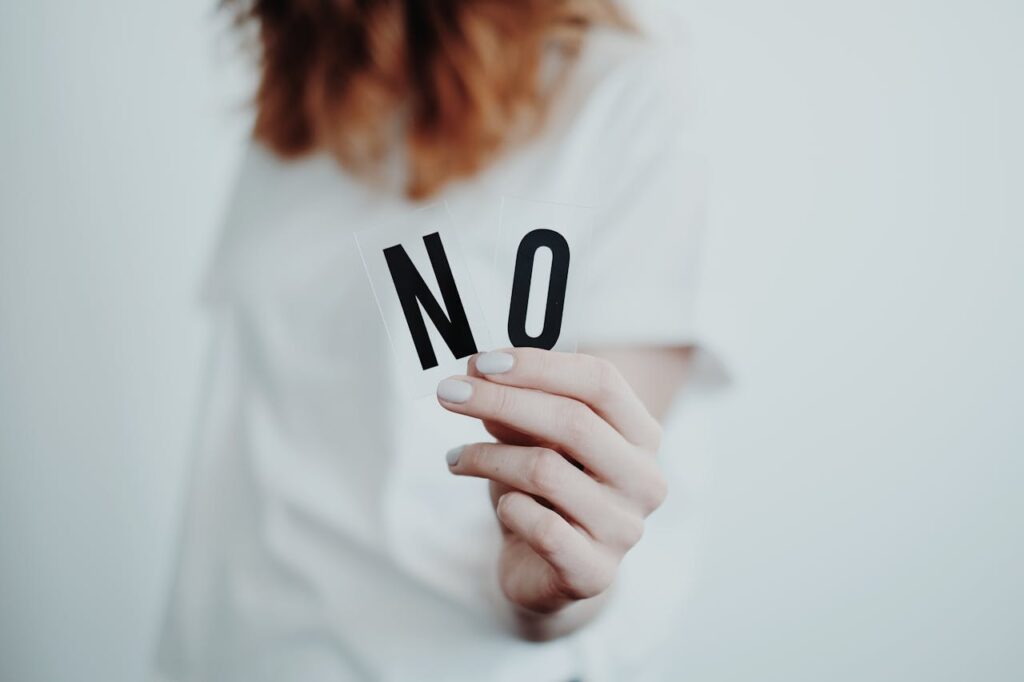
Join 130k subscribers and get the best of the week, straight to your inbox.
Do you feel like you’re on autopilot, going through your day but not fully present? It’s like a switch flipped somewhere, and now you’re not feeling like the person you used to be. Maybe a life event shook you up, or stress piled on until you lost sight of what makes you, you.
I remember a time when I could get lost in my own thoughts for hours. Daydreaming about the future used to give me a rush of excitement, and I’d just keep Googling ‘How to feel like yourself again’.
I had a clear image of who I wanted to be and what I wanted my life to look like. But as I got older, that thrill faded.
One day, I tried to imagine a happier version of myself, and nothing came to mind. It felt strange and unsettling. I didn’t hate my life or anything like that, but I wondered will I ever feel like myself again.
It can feel scary and frustrating when you can’t figure out why you feel distant from yourself.
You might ask, ‘Is this going to stay forever?’ or ‘Will I ever feel like myself again?’ The good news is that, while it will take time and effort, it is absolutely possible to reconnect with who you are.
Feeling disconnected is common when day-to-day life gets chaotic, and you can’t keep track of your own thoughts or emotions. But no matter what caused it, there are clear steps you can take to feel grounded again.
Today I’m going to explain why these feelings of being lost hit you and how to get back to a sense of normalcy. Stick around, because you’re not alone, and this could be the first step toward feeling genuinely you once more.
Will I Ever Feel Like Myself Again?
If you’re not feeling like yourself, have faith that you can get that back. It might not happen in a snap, but small changes in your routine and mindset can bring about big improvements. Consistent steps—like prioritizing self-care, seeking counseling, or talking openly with supportive friends—can help you find your footing.
If you stay consistent and remain open to help, you’ll notice glimpses of the person you used to be. And if you cannot figure out how to feel like yourself again on your own, professional help is always the way to go.
Why You’re Not Feeling Like Yourself Anymore?

Below are a few reasons why you might not be feeling like yourself:
Depression
The strongest reason the ‘I don’t feel like myself’ thought keeps clouding your head can be a mental health crisis. Depression often shows up as a loss of interest in activities you once loved and you may struggle to get out of bed or find it hard to focus. This condition can cloud your mind and make everything seem dull. If you think depression is at play and you want to understand how to be yourself again, reach out to a professional.
Emotional Numbness
Emotional numbness can work like your mind’s shield against overwhelming stress. What happens in numbness is that instead of sadness or anger, you might feel nothing at all. Daily life becomes a routine that you just go through, and there’s no real spark or reaction. While it can feel like you’re protecting yourself, emotional numbness also stops you from experiencing joy.
PTSD
Post-Traumatic Stress Disorder (PTSD) comes after a disturbing or life-changing event that took something from you or changed something about you. Following such an event, you may be more alert or easily startled.
Certain triggers can cause intense stress, which keeps you from relaxing into your usual self. PTSD can also disrupt how you connect with friends and family, so there’s an invisible, unsettling feeling that keeps you from being carefree or relaxed.
Hormonal Imbalance
Women are on a hormonal roller coaster all their lives, and these hormones influence our mood, energy levels, and reactions more than we realize. A sudden shift—due to medication, health conditions, or changes in daily routine—can cause tiredness or mood swings.
When your hormones are out of balance, it’s common to feel off-center or not quite like yourself. I am close to my period date and feeling sad about the most random things as we speak. Lol.
Anxiety

Anxiety can make you feel restless or tense—even when you’re not sure why. Racing thoughts can rob you of peace and keep you stuck in a cycle of worry. As a result, this can wear down your sense of who you are because you’re constantly on high alert.
Loved this reflection?
Join The Now Edit — my weekly letter for women reimagining how they live, work, and show up in the world.
Soulful storytelling. Gentle Strategy. Real Tranformation.
By signing up, you’re agreeing with our terms and conditions.
Burnout
Burnout comes from ongoing stress—from your job, relationships, or responsibilities. You may feel exhausted or even resentful about tasks that once felt easy. Such mental and physical strain leaves you feeling numb or detached.
Recognizing early signs—like constant fatigue or a lack of interest in daily activities—can help keep a handle on these feelings.
Narcissists Around
Spending too much time with narcissistic individuals can drain you. These people may belittle your feelings or make you doubt your reality, which chips away at your confidence.
With time, you can forget the things you enjoy or value. If someone’s manipulative or self-centered behavior is affecting you, you must set boundaries (we’re talking about that in a while).
How Can I Find Myself Again?

I get the feeling of living a life where your emotions are all over the place and your true sense of self is lost somewhere. But not all hope is lost, and you can reclaim yourself with well-planned steps.
If you’re unsure if you’ll ever feel like yourself again, here are some things you can try to turn things around:
Acknowledge Your Emotions
Your feelings deserve your attention, no matter how confusing they are because avoiding them or pretending they don’t exist only prolongs the struggle. You don’t have to vent to everyone but try to be honest with yourself.
Label what you’re feeling: sadness, frustration, or even emptiness to write it down or say it aloud in a private space. Naming your emotions gives you a starting point to work from.
Prioritize Self-Care

When you’re not feeling like yourself, show yourself some love. Life can get busy, and you may put yourself last without noticing. But if you never slow down, the risk of losing touch with who you are increases.
Basic self-care can mean making sure you drink enough water, get decent sleep, or walk outside for a whole.
Practice Self-Compassion
We’re our biggest critics, and that impacts the way we feel. If your inner voice often says, “I should be over this by now,” or “I’m failing at life,” step back and counter it with kindness.
Treat yourself how you would treat a good friend who’s struggling. This shift in mindset helps you see that you’re human, not a machine, and everyone has setbacks.
Get Your Nutrients Assessed
Sometimes, feeling off isn’t just “in your head.” Deficiencies in vitamins or minerals can cause real changes in mood and energy.
When feeling low and dissociating becomes a routine, get a blood test to check levels of vitamin D, B9, B12, and other key nutrients because their deficiency can impact your mental health. Your doctor may then recommend supplements or small diet changes to balance your body from the inside and help lift that mental fog.
Practice Grounding
Grounding is a way to tap back into the present moment—it essentially means that you pause and notice your surroundings. You can focus on what you see, hear, or feel for a minute or two to shift your mind away from racing thoughts or heavy worries.
Grounding may feel like pressing the reset button on your mental state—to remind you that you’re here, now, and can only do so much in this one moment.
Set Boundaries to Protect Your Mental Energy

If you’re often drained by certain people or commitments, you can lose track of who you are. And setting boundaries means saying “no” to extra responsibilities when you’re overwhelmed or limiting time with people who make you feel bad.
Boundaries aren’t mean; they preserve your sense of doing what you want to do. You have every right to protect your peace and free up emotional energy to invest in the things and people who help you grow.
Reconnect with Your Body
Feeling disconnected from yourself can start with ignoring your body’s signals. That’s why you should find an activity that helps you become more aware of how you feel physically. It could be a walk, stretching, or some yoga poses.
While you’re at it, pay attention to your breathing and see how your muscles feel. If you tune in to your body, it’s easier to stay present and recognize what you need to lead a more connected life.
Find Your Perfect Waking Up Time
I once thought sleeping in would help me feel more rested but turned out, I felt more sluggish and depressed when I woke up too late. But once I picked up the routine of waking up early, my energy levels started changing.
Therefore, you should also experiment with different wake-up times to see what feels right for you. The goal is to align your schedule with your natural rhythm so you feel more refreshed and in control at the start of each day.
Meditate

Meditation makes you feel more connected and the best part is, it doesn’t have to be long or complicated—even three to five minutes of deep breathing can calm your mind and help you center yourself. You don’t have to sit cross-legged on the floor, either.
Find a comfortable spot—your bed, a chair, or in your car before work to let your thoughts come and go.
Manifest
If your worry is that will I ever feel like myself again, try to manifest that life since that’s the end goal. Manifesting can mean different things to different people, but it boils down to setting a clear intention for what you want and believing you can reach it.
It’s about focusing and taking steps in the direction of your goals. You should also write down what you’d like to change or achieve and then think about the little actions you can take each day.
Journal Daily

How do I feel like myself again? Talk to the person you used to be.
Journaling is your private space where you can be honest without fear of judgment. Use it to write anything: small wins, big worries, random thoughts.
Slowly your journal entries will reveal what triggers you, what excites you, and what patterns keep coming back when you feel dissociated. That insight can guide you toward better decisions that align with your true self.
Take Therapy
Therapy isn’t just for people in crisis—it can be a proactive choice to understand yourself better and learn coping strategies.
A therapist can offer a perspective you may not see on your own. Women, especially mothers, often say that I don’t feel like myself after all the changes I have been through. A therapist or counselor can guide you through emotional roadblocks and point out blind spots.
You don’t have to be at your lowest point to benefit from therapy. Going even when you’re “okay” can help you get to a place where you feel good.
How Long Does it Take to Feel Like Yourself Again?
There’s no universal answer—some people feel better in weeks, while others may need months or longer if they’re dealing with deep emotional wounds or major life changes. The process isn’t linear, and that’s okay.
What matters is consistent effort. If you’re trying to reconnect with who you are, start small: spend ten minutes each day doing something that lifts your spirit, whether that’s journaling or enjoying a quiet moment. Over time, these tiny habits add up, and you’ll notice glimpses of your former spark.
Embrace Yourself for Who You Are
You have what it takes to find yourself again, no matter how lost you feel right now. Keep your steps small and your heart open. Each honest effort you make is a victory that gets you closer to that familiar sense of self you’ve been missing. Trust yourself and keep moving forward.
Suggested Reads:
FAQs
Will I ever feel like myself again after having a baby?
Yes. Welcoming a child is a huge shift—you’ll feel lost or overwhelmed at first, but that doesn’t mean your old self is gone forever. Carving out pockets of time, even just 15 minutes, to reconnect with activities you enjoy is a good start. Then, talk to loved ones or other new parents who understand what you’re going through. Little by little, you’ll blend your new role with the person you’ve always been.
Why do I feel emotionless?
Feeling numb can happen when you’re overwhelmed or burned out. It can be your mind’s effort to protect you from intense stress by blunting all emotions, both good and bad. A practical step is to slow down and notice what’s happening around you—what you see, hear, or touch. Short grounding breaks can help you snap out of autopilot mode.
How to stop feeling hopeless?
Hopelessness creeps in when you can’t see a path forward. To combat that, you should set realistic goals—like getting out of bed at a certain time or completing one meaningful task each day. Celebrate these small wins and remind yourself that progress might not be huge, but it’s still progress.
Zakia Lott
More Like This:








